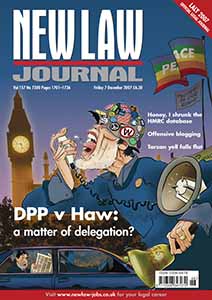THIS ISSUE

Should the law always respect the autonomous decisions of competent patients? Seamus Burns investigates
Jane Foulser McFarlane pinpoints the best way of successfully registering a sound as a trade mark
Soundbites versus argument
Julian Broadhead blames political myopia and mindless bureaucracy for the present prison crisis
In brief
In brief
Nicholas Dobson looks at how far officers in the public sector can delegate their powers
MOVERS & SHAKERS

Hugh James—Jonathan Askin
London corporate and commercial team announces partner appointment

Michelman Robinson—Daniel Burbeary
Firm names partner as London office managing partner

Kingsley Napley—Jonathan Grimes
Firm appoints new head of criminal litigation team
NEWS
Personal injury lawyers have welcomed a government U-turn on a ‘substantial prejudice’ defence that risked enabling defendants in child sexual abuse civil cases to have proceedings against them dropped
Children can claim for ‘lost years’ damages in personal injury cases, the Supreme Court has held in a landmark judgment
The cab-rank rule remains a bulwark of the rule of law, yet lawyers are increasingly judged by their clients’ causes. Writing in NLJ this week, Ian McDougall, president of the LexisNexis Rule of Law Foundation, warns that conflating representation with endorsement is a ‘clear and present danger’
Holiday lets may promise easy returns, but restrictive covenants can swiftly scupper plans. Writing in NLJ this week, Andrew Francis of Serle Court recounts how covenants limiting use to a ‘private dwelling house’ or ‘private residence’ have repeatedly defeated short-term letting schemes
Artificial intelligence (AI) is already embedded in the civil courts, but regulation lags behind practice. Writing in NLJ this week, Ben Roe of Baker McKenzie charts a landscape where AI assists with transcription, case management and document handling, yet raises acute concerns over evidence, advocacy and even judgment-writing






